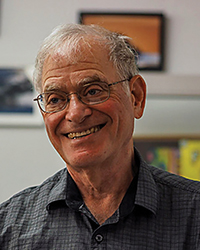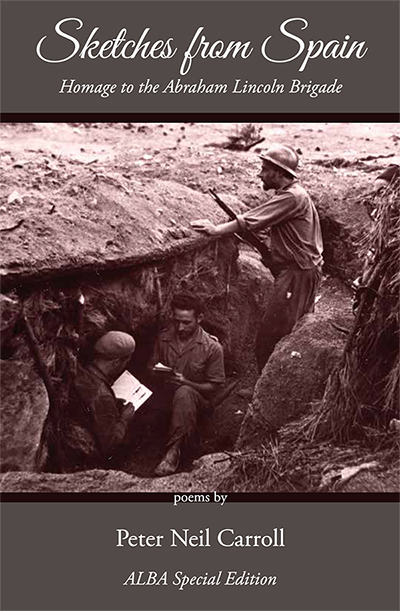Sketches from Spain
poems by
Peter Neil Carroll
~110 pages, ISBN: 978-1-59948-981-0, $16 (+ shipping)
Release Date: January 24, 2024
The Advance Sale Discount price on this title has expired. For those who prefer to pay by check the price is $20/book (which includes shipping & sales tax) and should be sent to: Main Street Rag, 4416 Shea Lane, Mint Hill, NC 28227.
A Special Editon version of this title was released in October, 2023 through Abraham Lincoln Brigade Archives (ALBA). That version is NOT available for purchase from Main Street Rag.
 Peter Neil Carroll, poet and historian, has published over twenty books, including eight previous collections of poetry: This Land, These People: The 50 States which won the 2022 Prize Americana; Talking to Strangers: Poetry of Everyday Life; Something is Bound to Break (Main Street Rag); and Riverborne: A Mississippi Requiem. He is author and editor of many books about the Spanish Civil War including The Odyssey of the Abraham Lincoln Brigade and From Guernica to Human Rights. He is currently Poetry Moderator for Portside.org and editor of the quarterly journal The Volunteer. He lives in California.
Peter Neil Carroll, poet and historian, has published over twenty books, including eight previous collections of poetry: This Land, These People: The 50 States which won the 2022 Prize Americana; Talking to Strangers: Poetry of Everyday Life; Something is Bound to Break (Main Street Rag); and Riverborne: A Mississippi Requiem. He is author and editor of many books about the Spanish Civil War including The Odyssey of the Abraham Lincoln Brigade and From Guernica to Human Rights. He is currently Poetry Moderator for Portside.org and editor of the quarterly journal The Volunteer. He lives in California.
Sketches from Spain is a narrative of the prescience and heroism of the American men and women who went to Spain to try to stop Franco’s, Hitler’s, and Mussolini’s Fascism before it inundated Europe and how America deleted it from history, hounding the returning veterans as “subversives.” It is also a love letter to the remarkable individuals who died and survived that tragic conflict, much of it in the poetry of the combatants’ own words. ~Elizabeth Zelvin, author, Gifts & Secrets and I Am the Daughter (poetry); The Bruce Kohler Mysteries and The Mendoza Family Saga (fiction)
There’s no one better suited to pay tribute to the “premature antifascists” of the Lincoln Brigade than Peter Neil Carroll, poet historian extraordinaire. Every poem in this stunning collection testifies to the exceptional nature of the Lincolns’ decision to put their lives on the line to stop fascism in its tracks—but also to the complexity of their experience and the political relevance of their example today. ~Sebastiaan Faber, author of Exhuming Franco: Spain’s Second Transition
In a moving series of poems, Carroll gives voice—in his words and theirs—to nearly 100 Americans who offered their lives to fight fascism in the Spanish Civil War. Echoes of Miles Davis resonate not just in the title but in the haunting melody. “You are history, you are legend,” they were told as they left Spain, yet they were written out of history. Today they speak, more for the future than the past. ~Anthony L. Geist
The Unknown Soldier
Too late to name, none
alive to tell who’s smiling
in a trench, the dark-browed boy
in a loose uniform,
short goatee, holding a book
whose title the camera cannot see.
Does it matter who he is
or why he’s smiling, what he read?
He was there,
Spain 1937
in ill-fitting trousers and shirt,
fighting fascists,
anonymous, immortal.
Abe & Jack, Milt, Moe, Dave…
They were not my family. They distrusted
strangers. I could only approach them slowly,
these Americans who had volunteered
to fight fascists in the Spanish Civil War.
They lost, bad guys won—they bore failure
like primal sin or first love that comes and
goes, never leaves. In their homes they kept
fetishes—Guernica prints, Spanish brandy.
Their loyalties were born of danger and death.
They invited me not eagerly, but lacking
choice, if they wished to outlive themselves.
Each craved to be last of the Lincoln Brigade.
I became expert at funerals and obituaries. Death
beds I avoided but sometimes compassion exceeded
common sense. I cared for them, for Abe & Jack,
Milt, Moe, Dave, Eddie, Marion, the three Bills.
I miss them. They were history, they were legend.
Their example led me to enter intimately into life’s
calamities—to seek a role, a small role, or merely
the hope of a role—to speak against injustice.
Not victory but the promise amplified their cause,
living with purpose. Without their voices now,
it takes arrogance for me to claim a historic role,
though silence means insignificance, defeat.
Tontine for the Last of the Lincoln Brigade
On the first day, Charlie Edwards peeked
over the hill at Jarama, a shot pierced his eye—
he’d come to Spain from Pennsylvania, all
anyone knew about Edwards, he should
have kept his head down, Number One.
Uncounted, the American volunteers died
in the olive groves and dry valleys of Spain.
Shell fragments knifed the rabbi’s son,
audacious Wally Burton dueled a marksman
from the fascist side—and fell.
Surrender raised the score: a Queens boy
saw a fascist slap a prisoner, stood up to help,
got pistoled in the head; two painters
from Greenwich Village for months carried
Goya’s Disasters of War. They died under
an olive tree, names added to 800 dead.
Fifteen hundred returned with nightmares,
the wounded Brannan gulped the oven’s gas,
Nurse Hannah jumped off a tenement roof.
The next war led 24 more into quick-dug graves
in Normandy, Luzon, India, New Guinea.
Most lived to propagate, became carpenters,
electricians, typesetters, screenwriters, anthropologists,
longshoremen, engineers, agitators, atomic spies,
social workers, florists. The two best poets died
before they were 50; the gay Finn guerrilla drank
unto death after a fling with an English laureate.
Later, you name it, someone had it. McLeod a slow
melanoma, Lucid his heart, George the prostate,
Sam dementia. The pancreas caught Moe at 91.
He’d kept the living names on a crossed-off list
that tallied 39, falling fast. Jack the Kid was 90.
Slender ones, fluid on their feet, lived longest,
competed for attention. Each wanted to be last.
Ages rose, numbers fell. Delmer Berg, reached 100,
basked in the final fuss, but the joke was on him.
An unknown named Brage beat him by three years.


 Peter Neil Carroll, poet and historian, has published over twenty books, including eight previous collections of poetry: This Land, These People: The 50 States which won the 2022 Prize Americana; Talking to Strangers: Poetry of Everyday Life; Something is Bound to Break (Main Street Rag); and Riverborne: A Mississippi Requiem. He is author and editor of many books about the Spanish Civil War including The Odyssey of the Abraham Lincoln Brigade and From Guernica to Human Rights. He is currently Poetry Moderator for Portside.org and editor of the quarterly journal The Volunteer. He lives in California.
Peter Neil Carroll, poet and historian, has published over twenty books, including eight previous collections of poetry: This Land, These People: The 50 States which won the 2022 Prize Americana; Talking to Strangers: Poetry of Everyday Life; Something is Bound to Break (Main Street Rag); and Riverborne: A Mississippi Requiem. He is author and editor of many books about the Spanish Civil War including The Odyssey of the Abraham Lincoln Brigade and From Guernica to Human Rights. He is currently Poetry Moderator for Portside.org and editor of the quarterly journal The Volunteer. He lives in California.